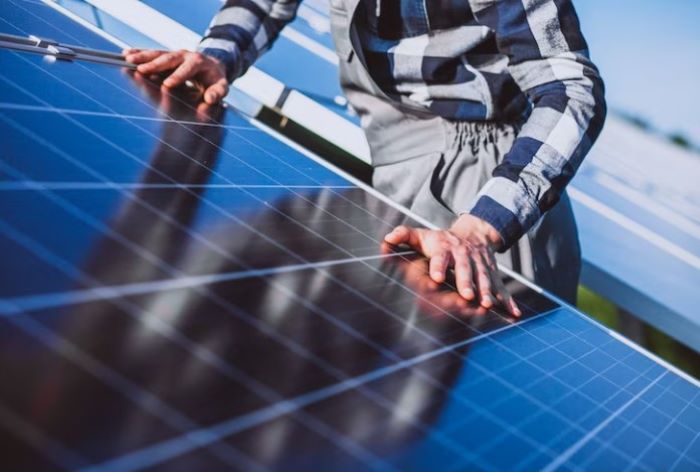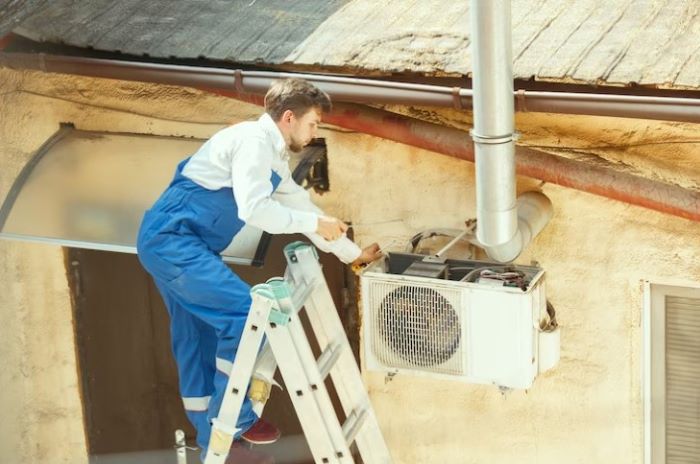Miami enjoys 249 days of sunshine annually, which is why it is a popular tourist destination. But it also means that Miami residents have to rely on an efficient and reliable HVAC system to keep their homes cool in the summer. With the rising energy costs, finding the most energy- and cost-efficient solution for heating and cooling is necessary. Adopting solar-powered systems perfectly aligns with this goal of ensuring you can get effective cooling while reducing costs and environmental impact.
Use this guide to stay informed on how to develop and install solar-powered HVAC systems in Miami.

How Do Solar-Powered HVAC Systems Work?
Solar-powered HVAC systems rely on solar energy to power the heating and cooling processes of the system. Multiple parts and components are involved that collect and convert solar energy to power the entire system.
Solar Panels
The HVAC system is built with solar panels responsible for capturing the sunlight. These panels must be placed in areas with direct sunlight exposure for maximum energy storage. Photovoltaic cells convert that sunlight into solar energy.
Solar Power Batteries
Any energy converted by the solar panels from sunlight is directly utilized to power the HVAC system or be stored in batteries. This ensures adequate energy storage to provide continuous operation at night or in case there is low sunlight.
HVAC System
The HVAC system is the next component of a solar-powered HVAC system. When used for heating, it utilizes solar energy to activate the heat pumps and bring warm air into your home. When in cooling mode, it uses solar energy to remove indoor heat and replace it with cooled air for a more comfortable environment.
Traditional vs. Solar-Powered HVAC Systems
Several elements distinguish traditional HVAC systems from solar-powered ones. The most apparent difference between the two systems is the power source.
Traditional HVAC systems rely on the electric grid and non-renewable resources, like fossil fuels, to power the system. On the other hand, solar-powered HVAC systems rely on a renewable source: energy from the sun. Therefore, solar-powered systems offer a sustainable alternative that enables them to harness clean energy.
Energy efficiency is also another factor that differentiates these two systems. Traditional HVAC systems have a fixed efficiency level, which could generate lots of energy waste. But solar-powered systems are made with high-efficiency components that maximize energy consumption for optimal performance. In addition, any excess energy generated by solar panels is stored in batteries, which you can use later on.
Solar-powered HVAC systems differ from traditional ones due to their resilience. For example, extreme weather conditions are typical in Miami; hurricanes could damage the electrical supply. When this happens, it disrupts the power source for traditional HVAC systems, making them incapable of operating independently. However, solar-powered HVAC systems use the energy stored in the batteries, ensuring safety and comfort even during power outages.
It is possible to integrate traditional and solar-powered HVAC systems. For example, solar panels can provide backup power or supplementary cooling (or heating) to your Miami home or business. Integrating solar panels also reduces the burden on traditional HVAC systems so that they won’t utilize as much energy.

Benefits of Solar-Powered HVAC Systems
Using solar energy to run your HVAC system is an energy-smart move. Here are some benefits you can enjoy when you opt for this system.
- Energy Savings – You can save on energy costs using a solar-powered system. Sunlight is a free and renewable energy source, which could make the initial investment in solar panel systems worthwhile. Considering the rapid increase in energy costs, this investment makes sense financially.
- Boost Home Value – Installing solar panels for your HVAC system can boost the overall value of your home. Homebuyers will appreciate solar installation as it will help them save on energy costs and switch to clean energy sources.
- Power Reliability – Even when there are power outages, you can keep your HVAC system running by tapping the stored solar energy to stay operational.
- Less Maintenance – There are fewer moving parts in a solar-powered HVAC system, meaning less maintenance and fewer repairs.
- Safer for the Environment – Using a renewable energy source reduces negative environmental impact, making it eco-friendly.
Considerations When Switching to Solar-Powered HVAC Systems
Do you want to enjoy the benefits of a solar-powered HVAC system? Here are essential tips to consider to help you choose the best system for your needs.
1. Site assessment.
A site assessment is crucial before you switch to a solar-powered HVAC system. You must determine the solar potential of your area before installing one. The roof orientation and amount of shading are crucial factors to consider. This helps determine the feasibility of placing solar panels to ensure you can collect sufficient sunlight for energy conversion. A professional installer can provide valuable insights about whether your location is a good candidate for this system.
2. Capacity and Sizing Requirements
Once the location is assessed, the next thing to consider is the capacity requirement for your household or business. Every home or business differs in its energy needs and requirements. Consider various factors such as the size of your home (or office), occupancy, and insulation. It is also vital to consider the climate conditions in Miami. It will help you pick the most efficient system for your needs.
3. Maintenance
Solar-powered HVAC systems require maintenance to ensure optimal performance and efficiency. You must regularly clean the solar panels as any debris could reduce the efficiency of their ability to collect sunlight. Inspection of electrical connections and monitoring battery health are crucial in making the most of the system.
However, each system has unique requirements you must consider to ensure maximum performance for the system.
4. Cost
The long-term benefits of solar-powered HVAC systems deliver cost savings in the long run. The initial upfront costs of installing solar-powered HVAC systems are higher. However, the potential savings on energy bills and possible tax credits make such an investment worthwhile.
5. Compliance
Before you switch to a solar-powered HVAC system for your home or business, it’s crucial to check local building codes and regulations. In addition, you must secure the necessary permit requirements before you conduct the solar installation.
Final Thoughts
A solar-powered system can offer several benefits if you rely on your HVAC systems to keep your home or business cool and comfortable. Consider the benefits and the installation requirements to decide if this is the best option for your needs.
